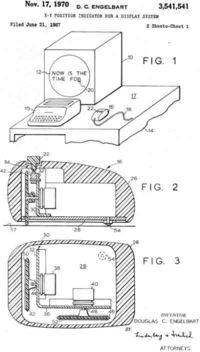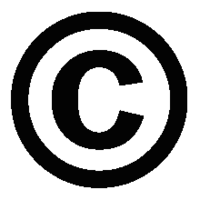 At ZDNet I wrote a lot about software patents, to the point where they seemed to be a problem mainly for open source.
At ZDNet I wrote a lot about software patents, to the point where they seemed to be a problem mainly for open source.
After the Roberts Court's refusal to make a decision in Bilski vs. Kappos, Google's competitors decided they could box in Android, a Linux distro Google's Open Handset Alliance had developed for mobile phones, by filing patent suits.
NOTE: This is the second in a series on open source subjects I'll be publishing here until I get a new paying gig around the subject.
What we've seen since is a bit like the opening of the First World War, everyone suing nearly everyone over absolutely everything. Florian Mueller has been following the action over at his FossPatents blog so you don't have to.
Right now it's a phony war, with all sides manuevering around various courts and claims. Shots will be fired if some court has to come to a decision, endorsing claims that Android is in violation of a patent and fixing damages. This would essentially make Linux in violation of patents.
But this is not really about open source at all. It's about the nature of innovation when machines are reduced to software. It's about the desireability of software patents, and the price we may be paying for them.
Consider the mouse. Xerox' Doug Engelbart won the first patent on a computer mouse in 1970. But he patented only one physical design for a computer mouse interface.
 There has been enormous innovation since then. We have had one-button mice, two-button mice, three-button mice. We have had trackball mice (mice turned upside down), mice for those with carpal tunnel syndrome from working with other mice, and a succession of laptop mice, culminating in a touchpad with buttons. Which led directly to touching the screen.
There has been enormous innovation since then. We have had one-button mice, two-button mice, three-button mice. We have had trackball mice (mice turned upside down), mice for those with carpal tunnel syndrome from working with other mice, and a succession of laptop mice, culminating in a touchpad with buttons. Which led directly to touching the screen.
But what if Engelbart had been able to patent the whole idea of a mouse interface? What if his patent had covered, not a specific mouse design, but the whole idea of a point-and-click controlled by software? What would have happened to innovation then?
Well, you might say, couldn't they each licese the Engelbart patent? Sure, but the game defeats itself. The second mouse maker licenses Engelbart, what does the third guy do? And the fourth? Do they have to license all those patents? Lawyers might well say yes. And small inventors would be forced out of the market in that case.
I've called this the mousetrap test. Patenting a mousetrap forces you to show your design and lets people design around you. It protects the innovation but also the right of future innovators to innovate. Patenting the idea of killing mice has the opposite impact on innovation. It slows it down, and eventually prevents it, because you can't get around basic concepts.
Which brings us to the problem of software patents. Because, at their heart, software patents protect ideas, not implementations. That's what copyright is supposed to be for.

But software patents don't protect code. They protect the idea behind the code. You can't write around them, as with copyright. For instance, you can write your own story on this issue, citing the same sources I did, even paraphrasing me, or quoting a bit of it with credit and/or a link. No problem. Many authors don't even give the credit, if their employers don't want it given to a competitor, although I try to get a link in myself when one inspires my work.
The mousetrap test, or something like it, has been around ever since software patents were first granted — by a court, not by Congress. In its Bilski decision, in fact, the Roberts Court merely affirmed a lower court ruling. It is entirely court-made law, something "originalists" claim can't and shouldn't be done.
In this case, they're right. We've seen that since the original pro-software patent cases were decided. And, as Bitlaw notes, courts are now trying to pull back. But it's like diplomacy in the face of the Guns of August. Armies of lawyers are on the march.
Only Congress has the power to recall those lawyers, but that won't happen in a divided Congress unless the industries which are impacted agree on a solution. Getting such an agreement means going to all industries impacted — especially the medical industry — and hammering something out, then presenting it and getting it through both Houses. Hard to do, but not impossible if the initial business agreement is in place.
I have hope this can happen. The medical industry is now starting to feel the impact of software patents, as more-and-more devices become software-driven.
Meanwhile, billions of dollars will be wasted here defending the indefensible.










I will cut and paste from people’s blogs to send to a friend whose workplace nannyware won’t let her click the link. I try to always include the blogger’s name and/or say “an excerpt from Jane’s blog” but sometimes fail. Is this a violation of copyright?
(Well, logically it is. Apologies.)
I’m sure there are many others who do this, not with an intent to plagiarize, but with an intent to say “Look who had a cool idea!”
I will cut and paste from people’s blogs to send to a friend whose workplace nannyware won’t let her click the link. I try to always include the blogger’s name and/or say “an excerpt from Jane’s blog” but sometimes fail. Is this a violation of copyright?
(Well, logically it is. Apologies.)
I’m sure there are many others who do this, not with an intent to plagiarize, but with an intent to say “Look who had a cool idea!”
Let’s also reflect on the Constitutional basis for patents. The Constitution stipulates it’s for the “advancement of he useful arts and sciences”. If patents aren’t serving that purpose in the context of software then such patents have no constitutional justification.
Patents themselves are not a right afforded to the public. What the Constitution says is Congress has a right- a right to decide who and what gets a patent.
Knuth said it clearly- the patenting of software amounts to patenting the arguments used by lawyers in court or the idea of a romance novel. These things can both be broken down into their constituent parts and elaborated upon to exactly the same level of detail that software patents are. They’re useful, that’s clear.
So if we’re going to be consistent, let’s patent lawyer’s arguments and ideas for screenplays and let’s patent special effects sequences used in movies, and let’s patent legal contracts and let’s patent business methods and.. oh, wait… we do do that.
It’s consistent. Destructive, but consistent.
The reality is, big players like IBM and M$ would have to rework their business plans and innovate more and faster and provide more value if software patents were rolled back. Gates has said that the shelf life of a good idea is about that of a banana.
Actually that’s not true at all. IntelliJ has no patents, and yet they continue to do very well. The issue is, are you structured to be dependent on patents and lawyers keeping competition out of the market or are you structured to produce innovative products people want to pay for?
In software, we innovate every hour every day of our working lives with the same fluidity and freedom novelists create new characters, dialog and plots. There is not some unbearable overhead to innovation that requires decades of unpaid R and D. That level of effort is what universities produce, and they have traditionally done it without the benefit or expectation of software patents..
That’s how operating systems were created. That’s how the internet was created. That’s how the protocols were created. That’s how browsers and webpages were created. That’s how e-commerce was created.
Is that proof enough that a software economy does not need patents in order to innovate and supercharge an economy?
If not, what level of proof would suffice?
None?
Oh, you must be an IP lawyer.
Let’s also reflect on the Constitutional basis for patents. The Constitution stipulates it’s for the “advancement of he useful arts and sciences”. If patents aren’t serving that purpose in the context of software then such patents have no constitutional justification.
Patents themselves are not a right afforded to the public. What the Constitution says is Congress has a right- a right to decide who and what gets a patent.
Knuth said it clearly- the patenting of software amounts to patenting the arguments used by lawyers in court or the idea of a romance novel. These things can both be broken down into their constituent parts and elaborated upon to exactly the same level of detail that software patents are. They’re useful, that’s clear.
So if we’re going to be consistent, let’s patent lawyer’s arguments and ideas for screenplays and let’s patent special effects sequences used in movies, and let’s patent legal contracts and let’s patent business methods and.. oh, wait… we do do that.
It’s consistent. Destructive, but consistent.
The reality is, big players like IBM and M$ would have to rework their business plans and innovate more and faster and provide more value if software patents were rolled back. Gates has said that the shelf life of a good idea is about that of a banana.
Actually that’s not true at all. IntelliJ has no patents, and yet they continue to do very well. The issue is, are you structured to be dependent on patents and lawyers keeping competition out of the market or are you structured to produce innovative products people want to pay for?
In software, we innovate every hour every day of our working lives with the same fluidity and freedom novelists create new characters, dialog and plots. There is not some unbearable overhead to innovation that requires decades of unpaid R and D. That level of effort is what universities produce, and they have traditionally done it without the benefit or expectation of software patents..
That’s how operating systems were created. That’s how the internet was created. That’s how the protocols were created. That’s how browsers and webpages were created. That’s how e-commerce was created.
Is that proof enough that a software economy does not need patents in order to innovate and supercharge an economy?
If not, what level of proof would suffice?
None?
Oh, you must be an IP lawyer.
I have my own business about real estate in my home country, and I try to read all the possible information about the issue on the net. Thanks for this great resource. These days we have a crisis similar to USA, and the best way to get better is learning about the solutions and measures taken in America. Thanks again
I have my own business about real estate in my home country, and I try to read all the possible information about the issue on the net. Thanks for this great resource. These days we have a crisis similar to USA, and the best way to get better is learning about the solutions and measures taken in America. Thanks again
Let’s patent the production of money. Then Mustafa HopenChange can’t print anymore money, eroding our wealth, and with ‘our’ I mean the people who work, who produce, who have been retired etc. Not the bloodsucking lazy liberals who need to grow out of their seventies ideologies.
Let’s patent the production of money. Then Mustafa HopenChange can’t print anymore money, eroding our wealth, and with ‘our’ I mean the people who work, who produce, who have been retired etc. Not the bloodsucking lazy liberals who need to grow out of their seventies ideologies.
Brilliant post! Patent law is intended to protect the inventor and simultaneously provide a public good.
Brilliant post! Patent law is intended to protect the inventor and simultaneously provide a public good.
Peer learning is great. Many institutions of learning now promote instructional methods involving ‘active’ learning that present opportunities for students.
Peer learning is great. Many institutions of learning now promote instructional methods involving ‘active’ learning that present opportunities for students.
Software-related inventions are patentable. Patents are intended to promote innovation by encouraging the timely disclosure of how to make and use inventions and by protecting investments made to commercialize inventions.
Software-related inventions are patentable. Patents are intended to promote innovation by encouraging the timely disclosure of how to make and use inventions and by protecting investments made to commercialize inventions.
you tube google sniper
Dana Blankenhorn: The software patent mouse trap
click the following internet page
Dana Blankenhorn: The software patent mouse trap
nice post it is important for me thank you for shhering it.
nice post it is important for me thank you for shhering it.
Avid Pro Tools 2020 Crack can generate, document, blend songs also as noises. they need really easy software which guarantees the relief of creating use of this device really helpful way. Because lately everybody desires some sort of songs of his personal choice to help to form his time great with great songs. Songs and sound benefits use Avid Pro Tools Latest Version. in comparison with any various other electronic audio workstation to help them to make, document, modify, series. this text could also be the chance it’s possible to also make your personal songs. Maintaining an equivalent necessity this Avid Pro Tool Serial key’s particularly created for newbies also as for experts also.
Avid Pro Tools 2020 Crack can generate, document, blend songs also as noises. they need really easy software which guarantees the relief of creating use of this device really helpful way. Because lately everybody desires some sort of songs of his personal choice to help to form his time great with great songs. Songs and sound benefits use Avid Pro Tools Latest Version. in comparison with any various other electronic audio workstation to help them to make, document, modify, series. this text could also be the chance it’s possible to also make your personal songs. Maintaining an equivalent necessity this Avid Pro Tool Serial key’s particularly created for newbies also as for experts also.